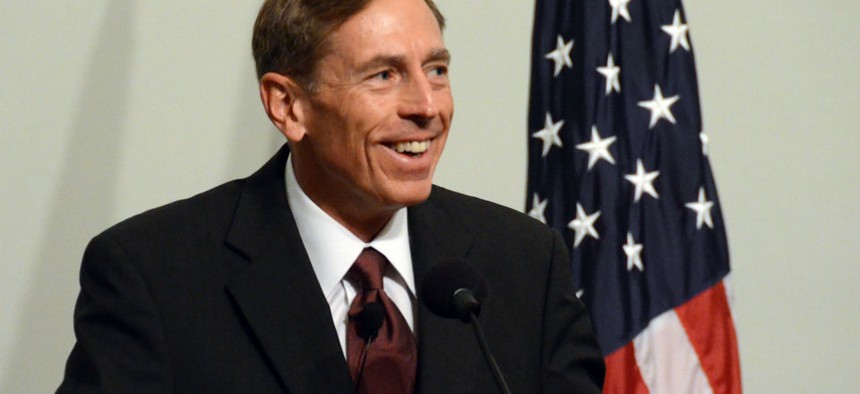
Retired Gen. David Petraeus, giving remarks to CIA employees in 2011. CIA file photo
One Way Officials Can Dodge a Question
Activist who tried to pose questions to retired Gen. David Petraeus at an event went to jail instead.
Top federal officials who speak in public usually feel some obligation to submit to tough questions from the press—or from anyone in an audience who manages to get to the microphone. But retired federal officials may be a different story.
Just ask Ray McGovern, a long-time CIA analyst and active critic of recent U.S. military involvements and clampdowns on whistleblowers at national security agencies. On Oct. 30, McGovern was arrested and briefly jailed by New York City police for attempting to gain access to a speech by ex-CIA Director and Iraq war strategist Gen. David Petraeus.
“I had hoped to hear the photogenic but inept Petraeus explain why the Iraqi troops, which he claimed to have trained so well, had fled northern Iraq leaving their weapons behind at the first whiff of Islamic State militants earlier this year,” McGovern recounted in the Nov. 8 issue of Consortium News. “I even harbored some slight hope that the advertised Q & A might afford hoi polloi like me the chance to ask him a real question.”
McGovern, who had arranged for a friend to buy him a $50 ticket to hear Petraeus at the 92nd St. Young Men's and Young Women's Hebrew Association, was told by a security officer that he was “not welcome.”
McGovern, a Christian activist who during his career used to deliver the daily presidential briefing to the first President Bush, believes he knows why he was blackballed. The State Department, he confirmed, for years had him on a “be on the lookout for” list due to his anti-war protests. And on May 4, 2006, he made national television news in Atlanta, when, at the height of the Iraq war, he fought off security guards and shouted questions and debating points to then-Defense Secretary Donald Rumsfeld.
That “exchange wasn’t exactly the oh-so-polite give-and-take of the Sunday talk shows,” McGovern recalled, “but it represented what Americans should expect of democracy, a chance to confront senior government officials when they engage in deception or demonstrate incompetence – especially on issues of war or peace.”
More likely, Petraeus’s handlers may have gotten wind of his arrival through surveillance of his Catholic activist network, he said. Perhaps they assumed he would ask something embarrassing about the general’s admitted extramarital affair with author Paula Broadwell.
But McGovern calls that a “minor peccadillo. It was my intent to put the spotlight, via a question or two, on Petraeus’s far more consequentially dishonest behavior,” he wrote. “And this seemed particularly important at this point in time, as his starry-eyed emulator generals seem no less willing than Petraeus to throw a new wave of youth from a poverty draft into a fool’s-errand sequel in Iraq and Syria.”







